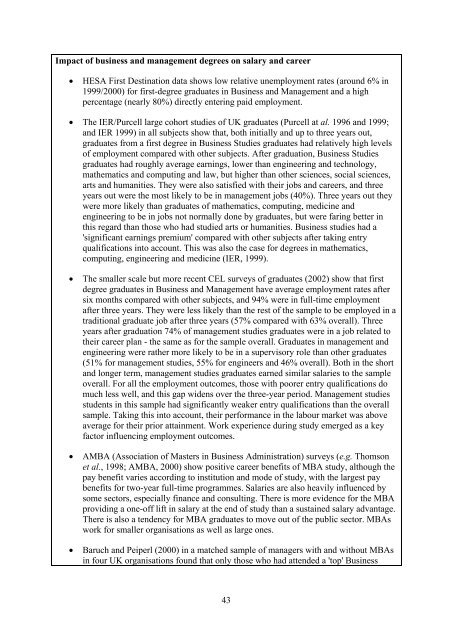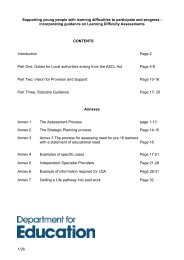The Development of Management and Leadership Capability and its ...
The Development of Management and Leadership Capability and its ...
The Development of Management and Leadership Capability and its ...
You also want an ePaper? Increase the reach of your titles
YUMPU automatically turns print PDFs into web optimized ePapers that Google loves.
Impact <strong>of</strong> business <strong>and</strong> management degrees on salary <strong>and</strong> career<br />
• HESA First Destination data shows low relative unemployment rates (around 6% in<br />
1999/2000) for first-degree graduates in Business <strong>and</strong> <strong>Management</strong> <strong>and</strong> a high<br />
percentage (nearly 80%) directly entering paid employment.<br />
• <strong>The</strong> IER/Purcell large cohort studies <strong>of</strong> UK graduates (Purcell at al. 1996 <strong>and</strong> 1999;<br />
<strong>and</strong> IER 1999) in all subjects show that, both initially <strong>and</strong> up to three years out,<br />
graduates from a first degree in Business Studies graduates had relatively high levels<br />
<strong>of</strong> employment compared with other subjects. After graduation, Business Studies<br />
graduates had roughly average earnings, lower than engineering <strong>and</strong> technology,<br />
mathematics <strong>and</strong> computing <strong>and</strong> law, but higher than other sciences, social sciences,<br />
arts <strong>and</strong> humanities. <strong>The</strong>y were also satisfied with their jobs <strong>and</strong> careers, <strong>and</strong> three<br />
years out were the most likely to be in management jobs (40%). Three years out they<br />
were more likely than graduates <strong>of</strong> mathematics, computing, medicine <strong>and</strong><br />
engineering to be in jobs not normally done by graduates, but were faring better in<br />
this regard than those who had studied arts or humanities. Business studies had a<br />
'significant earnings premium' compared with other subjects after taking entry<br />
qualifications into account. This was also the case for degrees in mathematics,<br />
computing, engineering <strong>and</strong> medicine (IER, 1999).<br />
• <strong>The</strong> smaller scale but more recent CEL surveys <strong>of</strong> graduates (2002) show that first<br />
degree graduates in Business <strong>and</strong> <strong>Management</strong> have average employment rates after<br />
six months compared with other subjects, <strong>and</strong> 94% were in full-time employment<br />
after three years. <strong>The</strong>y were less likely than the rest <strong>of</strong> the sample to be employed in a<br />
traditional graduate job after three years (57% compared with 63% overall). Three<br />
years after graduation 74% <strong>of</strong> management studies graduates were in a job related to<br />
their career plan - the same as for the sample overall. Graduates in management <strong>and</strong><br />
engineering were rather more likely to be in a supervisory role than other graduates<br />
(51% for management studies, 55% for engineers <strong>and</strong> 46% overall). Both in the short<br />
<strong>and</strong> longer term, management studies graduates earned similar salaries to the sample<br />
overall. For all the employment outcomes, those with poorer entry qualifications do<br />
much less well, <strong>and</strong> this gap widens over the three-year period. <strong>Management</strong> studies<br />
students in this sample had significantly weaker entry qualifications than the overall<br />
sample. Taking this into account, their performance in the labour market was above<br />
average for their prior attainment. Work experience during study emerged as a key<br />
factor influencing employment outcomes.<br />
• AMBA (Association <strong>of</strong> Masters in Business Administration) surveys (e.g. Thomson<br />
et al., 1998; AMBA, 2000) show positive career benef<strong>its</strong> <strong>of</strong> MBA study, although the<br />
pay benefit varies according to institution <strong>and</strong> mode <strong>of</strong> study, with the largest pay<br />
benef<strong>its</strong> for two-year full-time programmes. Salaries are also heavily influenced by<br />
some sectors, especially finance <strong>and</strong> consulting. <strong>The</strong>re is more evidence for the MBA<br />
providing a one-<strong>of</strong>f lift in salary at the end <strong>of</strong> study than a sustained salary advantage.<br />
<strong>The</strong>re is also a tendency for MBA graduates to move out <strong>of</strong> the public sector. MBAs<br />
work for smaller organisations as well as large ones.<br />
• Baruch <strong>and</strong> Peiperl (2000) in a matched sample <strong>of</strong> managers with <strong>and</strong> without MBAs<br />
in four UK organisations found that only those who had attended a 'top' Business<br />
43
















